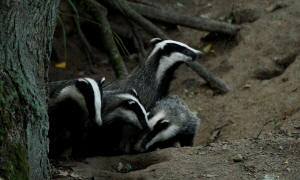|
Train traffic has been halted, possibly for weeks, between two major
southern cities, Den Bosch and Eindhoven, due to worries that the
badgers' tunnels have weakened the ground under the tracks.
But the company that maintains the country's rail network says the
badgers are protected by law and must be removed before repairs can
begin.
"Badgers are beautiful animals ... but it's clear they are a problem
for our safety on the railways," said Aldert Baas, spokesman for
ProRail.
The Dutch government on Wednesday said that 50,000 people per day
use the affected train line. Travellers are either being shifted to
buses or following a different route, adding 30-60 minutes to travel
times.
The plan to get things back on track is to create a new home nearby
for the badgers and then place a metal barrier along the tracks so
they cannot return.
Baas said it was not clear how long that will take.
Badgers, not an endangered species, nearly died out in the
Netherlands in the 1980s but have since made a strong recovery.
Vivianne Heijnen, the deputy minister for traffic and
infrastructure, said in a letter to parliament there were 40 places
that badger dens, known as setts, were close to train tracks.
"I have asked ProRail to keep a close watch on the activities of
badgers," Heijnen said.
"Once this is over, the process will be evaluated for possible
improvement."
(Reporting by Piroschka van de Wouw and Toby Sterling; Editing by
Alison Williams)
[© 2023 Thomson Reuters. All rights
reserved.] Copyright 2022 Reuters. All rights reserved. This material may not be published,
broadcast, rewritten or redistributed.
Thompson Reuters is solely responsible for this content.
|
|



